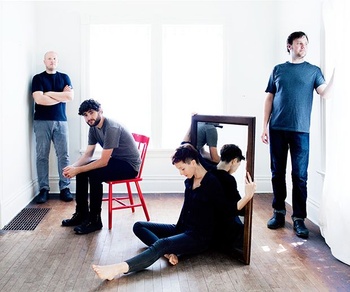(© Cameron Wittig)
“So are we made just to fight / All our lives / End it all on the bottom-dotted line”: on Poliça’s new album, Shulamith, Channy Leaneagh has not yet won her battle with life and love. Luckily, that battle gives us good music.
Because her management gave us the wrong time, we finished up, unwittingly, ringing Channy Leaneagh in the middle of the night. “It doesn’t matter: I’m a good sleeper,” she tells us a few hours later, when the morning really has begun for her in Minneapolis. In the background, there’s the clatter of pots and pans. “I have a few days off, so I’m doing some cooking and tidying up.” Soon Leaneagh will begin a tour that will introduce audiences to Shulamith, Poliça’s follow-up to 2012’s heartrending break-up album, Give You the Ghost, which was swathed in intoxicating electro-soul and polished trip-hop. The music, this time, is a bit harder, adding some dark groove to it, the lyrics tough and bleak.
The new album takes its name from Shulamith Firestone, a Canadian feminist known above all for her radical Marxist work The Dialectic of Sex and for Airless Spaces, an account of her life in psychiatric hospitals. Leaneagh calls her a mentor and a muse from the grave: Firestone died in 2012, after falling ill and withdrawing from public life. “The album was already finished when my little brother recommended that I read her books. I found that she was writing about things that I was trying to say in my songs but couldn’t because I didn’t have the knowledge she had.”
Was she as radical as people say?
Channy Leaneagh: For her time, sure. She wrote about in vitro fertilisation and women and men being able to have children without carrying them, she talked about childbirth being a horrible abuse to a woman’s body, about what feminism was and needed to be. She was asking people to separate themselves from society and turn society upside down. In the Sixties and Seventies her thoughts were pretty radical and very offensive to people. Later on, she got sick and got ostracised by her family, by the community. She died alone and kind of forgotten, but her death reignited people’s interest in her.
What is the link between Shulamith and the bloodstained album sleeve?
Leaneagh: The image refers to the brutality in a woman’s life that Shulamith wrote about. But the girl on the cover is not covered in blood: it’s hair dye. It’s that duality of something beautiful versus something brutal, beautification mixed with blood. A woman’s life is marked by childbirth, periods, there’s the connotation of loss of innocence, sex... All those things.
Poliça: the brutality of beauty


There is also a version with a pixelated cover.
Leaneagh: Yes, Amazon and iTunes thought the image was too violent. I’m not sure that they understand the image and why they think they had to censor it. A lot of album covers are overtly sexual, but if there’s a confusing image, they censor the fact that they don’t know what it means. In culture you need images that stimulate people’s brains and thoughts, that’s what art is supposed to do. It’s disappointing and disheartening to see that these big corporations can squeeze out the opportunity for people to be inspired.
“I don’t need a man,” you sing in the R&B-style song “I Need $”. You’re still not over it?
Leaneagh: For sure it’s sometimes good to have one. [Laughs] It’s just a song. I don’t think anyone needs one, but we might just have miserable lives if we were alone.
You have a tough outlook on love. In “Matty”, you express your candid opinion on marriage again, as you did on Give You the Ghost.
Leaneagh: I’m still not done with it. It is important to figure out what love means and what it is to enter into a lasting union with someone. To do it better in the future. When I got married I didn’t quite understand it and now I try to understand who I was when I was married, and what it does to you, and how you can avoid ending up in a divorce. What is the purpose of marriage? If it’s not a religious one, what does it do to a relationship?
“I’m a pawn in the hype machine,” you sing in “Tiff”, a track you made with Justin Vernon of Bon Iver. Do you feel at ease in the music business?
Leaneagh: It’s weird. When Poliça took off, I suddenly had to be part of this game that people play in the music industry, throwing an artist up and onto a pedestal they don’t belong on. And then tearing them down as quickly as they can, because the hype machine needs to be fed...
... and then Jay-Z puts up a video of you on his blog.
Leaneagh: Yeah. That was confusing. You never know who is really doing that stuff. It certainly wasn’t Jay-Z himself who put us up there. It’s all about control: who controls your life and your future. Your main goal is not to be famous, but to make music that you’re proud of.
Leaneagh: Yes, Amazon and iTunes thought the image was too violent. I’m not sure that they understand the image and why they think they had to censor it. A lot of album covers are overtly sexual, but if there’s a confusing image, they censor the fact that they don’t know what it means. In culture you need images that stimulate people’s brains and thoughts, that’s what art is supposed to do. It’s disappointing and disheartening to see that these big corporations can squeeze out the opportunity for people to be inspired.
“I don’t need a man,” you sing in the R&B-style song “I Need $”. You’re still not over it?
Leaneagh: For sure it’s sometimes good to have one. [Laughs] It’s just a song. I don’t think anyone needs one, but we might just have miserable lives if we were alone.
You have a tough outlook on love. In “Matty”, you express your candid opinion on marriage again, as you did on Give You the Ghost.
Leaneagh: I’m still not done with it. It is important to figure out what love means and what it is to enter into a lasting union with someone. To do it better in the future. When I got married I didn’t quite understand it and now I try to understand who I was when I was married, and what it does to you, and how you can avoid ending up in a divorce. What is the purpose of marriage? If it’s not a religious one, what does it do to a relationship?
“I’m a pawn in the hype machine,” you sing in “Tiff”, a track you made with Justin Vernon of Bon Iver. Do you feel at ease in the music business?
Leaneagh: It’s weird. When Poliça took off, I suddenly had to be part of this game that people play in the music industry, throwing an artist up and onto a pedestal they don’t belong on. And then tearing them down as quickly as they can, because the hype machine needs to be fed...
... and then Jay-Z puts up a video of you on his blog.
Leaneagh: Yeah. That was confusing. You never know who is really doing that stuff. It certainly wasn’t Jay-Z himself who put us up there. It’s all about control: who controls your life and your future. Your main goal is not to be famous, but to make music that you’re proud of.
What did you think when Justin Vernon called you “the best band I’ve ever heard”?
Leaneagh: Well, his brother is our manager, we weren’t that excited. [Laughs] He’s part of our community, and people usually talk very highly of their friends.
Which is the best band you have ever heard?
Leaneagh: [Thinks about it] Crass, that punk band. They made music for themselves and had no inhibitions. They were fearless, didn’t worry about money or fame. They made music they really believed in.
You grew up with folk records and played with your ex in the folk band Roma di Luna, covering the likes of Woody Guthrie, the Carter Family, and Lead Belly... That’s a completely different world.
Leaneagh: R&B, rap, blues...it’s all coming from the same story-telling, I guess. Even in Poliça, I still write tragic folk songs.
What sent you in the direction of electronica?
Leaneagh: It was just working with other people outside of my scene, and getting invited into Gayngs, Ryan Olson’s project.
Ryan Olson is a semi-permanent band member of Poliça, who doesn’t tour with you, but still pulls the strings. Isn’t that weird?
Leaneagh: Just because I named this record after a radical feminist, doesn’t mean that I want to be a perfect feminist. [Laughs] We do try to operate as democratically as possible. It’s nice to have a band member who is in the audience, which means he can keep an eye on the quality of the sound and the visuals.
A lot has been said about your digitally altered vocals. Why do you distort them?
Leaneagh: To add texture and character. Some people might think it’s to camouflage false notes, but that’s not the case. If you come to our live shows, you will hear it’s definitely not always in tune. [Laughs] Using machines doesn’t solve problems. It usually creates more problems.
Poliça • 29/1, 20.00, €20/23, Ancienne Belgique, boulevard Anspachlaan 110, Brussel/Bruxelles, 02-548.24.24, www.abconcerts.be
Leaneagh: Well, his brother is our manager, we weren’t that excited. [Laughs] He’s part of our community, and people usually talk very highly of their friends.
Which is the best band you have ever heard?
Leaneagh: [Thinks about it] Crass, that punk band. They made music for themselves and had no inhibitions. They were fearless, didn’t worry about money or fame. They made music they really believed in.
You grew up with folk records and played with your ex in the folk band Roma di Luna, covering the likes of Woody Guthrie, the Carter Family, and Lead Belly... That’s a completely different world.
Leaneagh: R&B, rap, blues...it’s all coming from the same story-telling, I guess. Even in Poliça, I still write tragic folk songs.
What sent you in the direction of electronica?
Leaneagh: It was just working with other people outside of my scene, and getting invited into Gayngs, Ryan Olson’s project.
Ryan Olson is a semi-permanent band member of Poliça, who doesn’t tour with you, but still pulls the strings. Isn’t that weird?
Leaneagh: Just because I named this record after a radical feminist, doesn’t mean that I want to be a perfect feminist. [Laughs] We do try to operate as democratically as possible. It’s nice to have a band member who is in the audience, which means he can keep an eye on the quality of the sound and the visuals.
A lot has been said about your digitally altered vocals. Why do you distort them?
Leaneagh: To add texture and character. Some people might think it’s to camouflage false notes, but that’s not the case. If you come to our live shows, you will hear it’s definitely not always in tune. [Laughs] Using machines doesn’t solve problems. It usually creates more problems.
Poliça • 29/1, 20.00, €20/23, Ancienne Belgique, boulevard Anspachlaan 110, Brussel/Bruxelles, 02-548.24.24, www.abconcerts.be
Read more about: Muziek
Fijn dat je wil reageren. Wie reageert, gaat akkoord met onze huisregels. Hoe reageren via Disqus? Een woordje uitleg.